Crimes, Prisons and Punishment
1066 – Act – Forest Law introduced by William the Conqueror. This protected the forests of England not just from poaching, but from anything which would harm them like unlawful felling or the cutting of peat.

1116 –Act – Debtors to the monarch could be imprisoned.
1216 –Prisons – By this date, after the Assize of Clarendon, all but 5 counties had set up Gaols, which were usually within castles. Prior to this, there were some prisons but punishment usually consisted of ‘instant justice’ i.e. whipping, the stocks or execution.
1350/51 –Act – Edward III first defines high treason as an act against the reigning monarch or the realm, including; making counterfeit currency, murdering members of the council or making an attempt on the monarch’s life.
1352 – Act – All debtors, whether to the Crown or a private individual, could be imprisoned.
1361 – Prison – Forest prison in Lyndhurst, Hampshire, set-up.
1394 –Bequest – Margaret Odiam leaves £10 rent charge for mass and faggots for Bury Gaol.
1446 – Prison – Forest prison at Clarendon Palace, Wiltshire, set-up.
1556 – Bequest – Griffith Amerideth leaves £524 to provide shrouds for prisoners executed at Kingswell, and to repair wall of burial ground.
1577 – Event – Black Assize at Oxford – All in court died within 40 hours from gaol fever (Typhus), including the Judge and Sheriff.
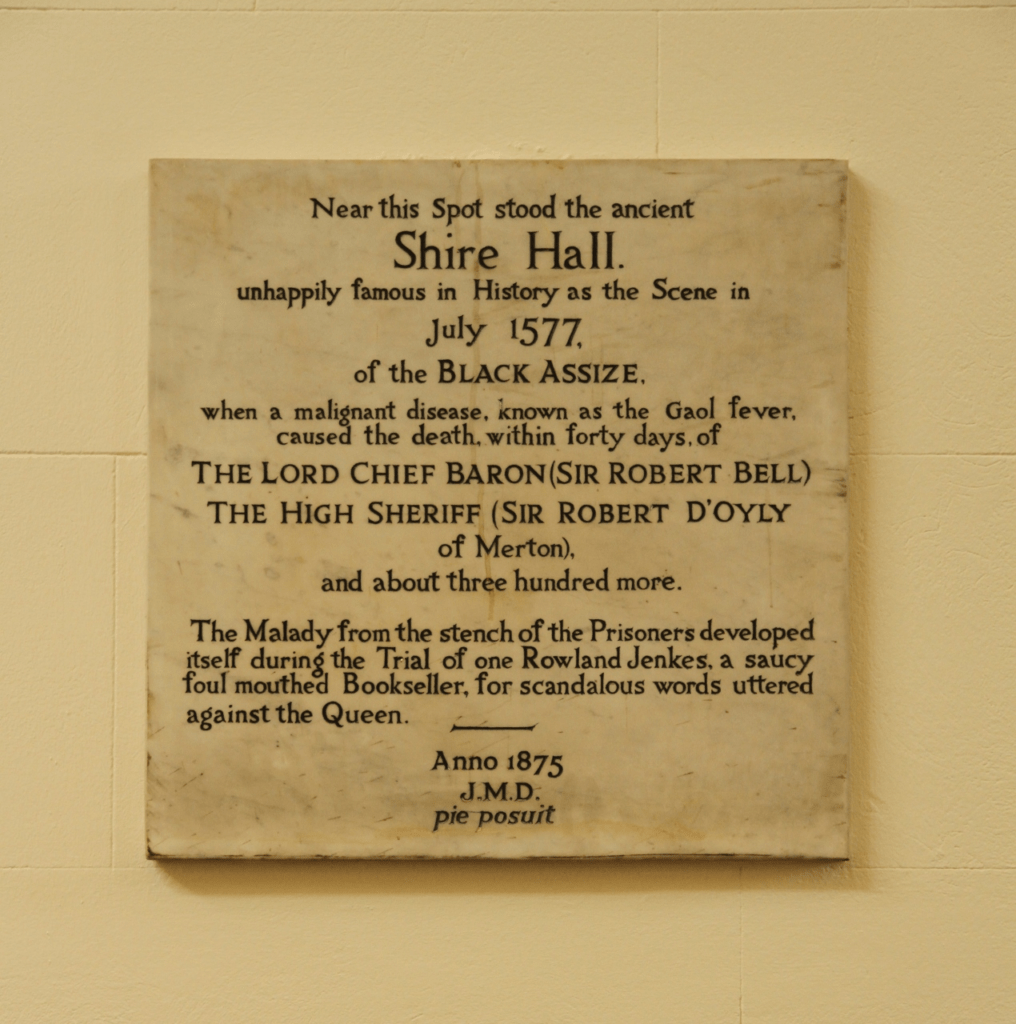
1597 – Vagabond Act – The first Act to allow for banishment or transportation from the Kingdom as punishment for rogues and vagrants. In addition, those willing to become indentured servants in America would have their death sentence commuted. This Act also called for the erection of hospitals and proto-workhouses.
1614 – Prison – Chesterfield Bridewell built.
1618 – Writing – Geffray Mynshull’s Prison Essays published, written whilst in a debtor’s prison, referring to the ‘villainy’, ‘debauchery’ and corruption of such places.
1619 – Transportation – Transportation to America Begins.
1670 – Prison – Wood St. Compter built.
1691 – Writing – Moses Pitt’s “Cry For The Oppressed” published, an account of the conditions of debtors prisons in England.
1699 – Aid Society – Society for Promoting Christian Knowledge (SPCK), a group set up to fight “vice and immorality” and to educate, holds Committee on Prisons.
1701 – Bequest – John Norris leaves £300 for books and beef for Norwich Gaol.
1704 – Prison – Pope Clement XI erects prison in Rome for education and reformation of youthful criminals.
1705 – Bequest – Robert Dowe leaves £1 6s. 8d. Rent charge for tolling a bell before executions at Newgate.
1716 – Prison – Lawford’s Gate Bridewell built in Bristol.
1715-1806 – Event – Sick and Hurt Commission (also known as the Sick and Hurt Board) set up to provide medical supplies, hospitals and support to injured seamen and were responsible for Prisoners of War.
1717 – Act – Transportation first regularly introduced by Act of Parliament.
1720 – Prison – Dartford Bridewell built.
1728 – Committee – General Oglethorpe’s Committee of House of Commons to investigate state of prisons in London. Exposed issues of wardens buying own offices, ill-treatment of debtors and corruption.
1730 – Event – At Taunton Lent Assize some hundreds, including the Judge and Sheriff, died of gaol fever (Typhus).
1730 – Aid Society – John Wesley, evangelist and social reformer, begins visiting inmates at Newgate Prison. There he preaches, educates, and cares for the sick.
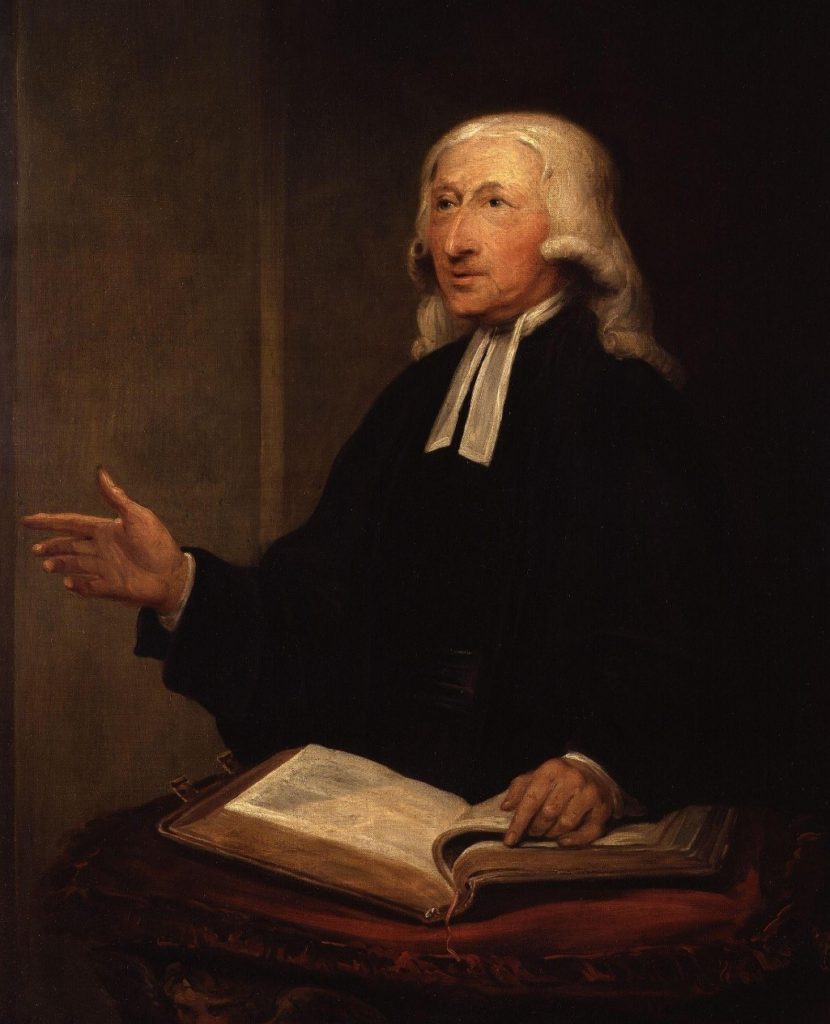
1735 – Committee – William Hay’s Parliamentary Committee on prisons. Introduced Bill for Poor Relief this same year, calling for regular inspection of prisons, but it was defeated.
1748 – Event – Sarah Peters, who visited Newgate Prison to give consolation to condemned prisoners, died of gaol fever (Typhus).
1750 – Event – A number died of gaol fever in London, including two judges and Lord Mayor.
1751 – Act – Sale of alcohol to inmates within prisons by prison officials banned by Act.
1751 – Executions – 63 hanged in London.
1756 – Event – 154 out of 170 British Prisoners of War died in the Black Hole of Calcutta, a prison fort.
1756 – Event – John Howard, prison reformer, was captured by French privateers and was latterly swapped after 6 days for a French officer.
1764 – Prison – Ludlow Town Gaol built.
1766 – Prison – Chelmsford Bridewell built.
1770 – Prison – First stone of Newgate laid.
1770 – Executions – Ninety-one condemned to death at the Old Bailey, forty-nine executed.
1772 – Aid Society – Society for Relief of Poor Debtors founded. A collection was made at Charlotte Street Chapel and Bedford Chapel and the money used to secure the release of 34 prisoners for debts. In addition, they raised awareness on the unfairness and conditions of debtors in prisons[1].
1772 – Prison – St George’s Fields Bridewell, Surrey, built.
1772 – Act – Peine forte et dure (hard and forceful punishment) to coerce a plead abolished; prisoners refusing to plead treated as guilty from now on.
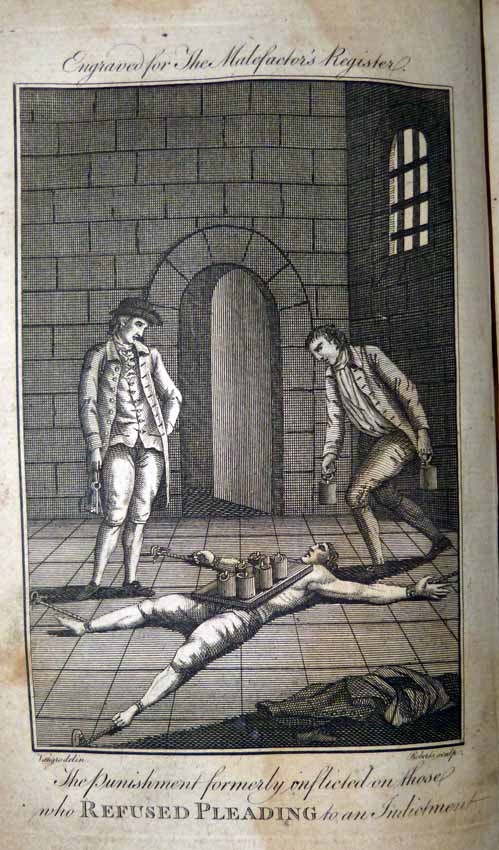
1772 – Writing – Rev. Samuel Denne wrote a pamphlet on the merits of separate imprisonment.
1773 – Act – Gaol Chaplains Act allowing Magistrates to appoint Chaplains to Prisons.
1774 – Act – Goal Act for abolishing Gaolers’ Fees and suggested sanitary improvements for prisons.
1774 – Prison – Manchester Bridewell rebuilt.
1775 – Transportation – Transportation to America ceased.
1775 – Prison – Separation at night and associated labour adopted by Ghent Prison, Belgium.
1775 – Prison – New Prison in Clerkenwell, built. Newport, Essex and Kingston on Thames, bridewells built.
1776 – Aid Society – Philadelphia Society for Assisting Distressed Prisoners set up by Quaker, Richard Wistar, to give soup to US inmates in Philadelphia[2].
1776 – Prison – Horsham Prison built under John Howard’s advice.
1776 – Prison Hulk – System of the Hulks began, 4,084 prisoners in England and Wales, of whom 2,437 were debtors. Prisoners first put aboard the Fusticia.
1777 – Writing – John Howard’s ‘State of the Prisons’ published. He advocates a regime of solitary confinement, hard labour and religious instruction. The objective of imprisonment, in his view, was reform and rehabilitation, not just punishment.
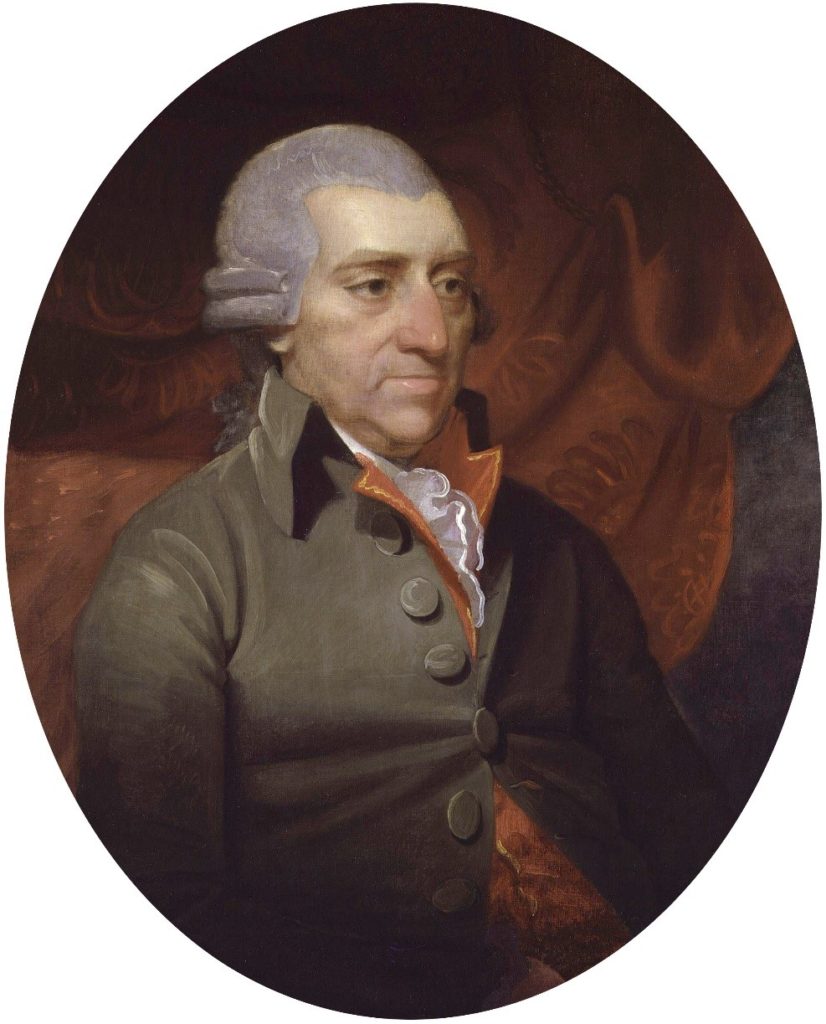
1778 – Act – Act for the establishment of Penitentiary Houses.
1779 – Writing – Second edition of John Howard’s ‘State of the Prisons’ published.
1779 – Prison – 244 prisons in England and Wales enumerated by John Howard besides some unvisited. Population of 244 prisons, 4,379.
1780 – Event – Lord Gordon Riots, caused by reduced legal discrimination against Catholics, saw The Bank of England, Newgate Prison and five other city prisons broken into.
1783 – Executions – Last execution at Tyburn, John Austin found guilty of highway robbery. 58 sentenced to death at the Old Bailey on the 24th September. First execution at Newgate Prison on the 3rd December.
1784 – Writing – Third edition of Howard’s ‘State of the Prisons’ published.
1784 – Execution – Last woman burned for murder.
1785 – Executions – 242 death sentences in England, of whom 103 were executed.
1785 – Prison – Population of Newgate nearly 600, whilst a further 600 prisoners were awaiting Transportation.
1787 – Transportation – Transportation to Botany Bay in Sydney begun, the first expedition taking 184 males and 100 females.
1787 – Aid Society – Pennsylvania Society for alleviating the miseries of public prisons founded. This was set-up to campaign for the humane treatment of prisoners[3].
1787 – Bequest – Elizabeth Dean leaves £156 to buy firewood for Reading Gaol.
1788 – Prison – Old Gaol, Winchester, built.
1788 – Aid Society – Philanthropic Society School founded. Their purpose was originally to find housing and training for the children of convicts, often criminals themselves[4].
1788 – Prison – Convict settlement formed at Port Jackson, near Sydney.
1788 – Prison – Petworth Prison opened.
1789 – Event – Bastille taken in France.
1789 – Writing – John Howard’s account of Lazarrettos in Europe.
1789 – Prison – Old Bridewell, Winchester, built.
1789 – Executions – Last woman ‘burned’ for coining i.e. using counterfeit money. (quotation marks as Catherine Murphy was hanged for 30 minutes before a fire was lit beneath her).
1790 – Event – John Howard dies.
1790 – Prison – Preston New Prison occupied.
1790 – Event – Of 939 convicts sent to Australia, 261 died on board and 50 more shortly after landing.
1790 – Event – Philadelphia begins solitary confinement.
1791 – Writing – Jeremy Bentham’s Panopticon published.
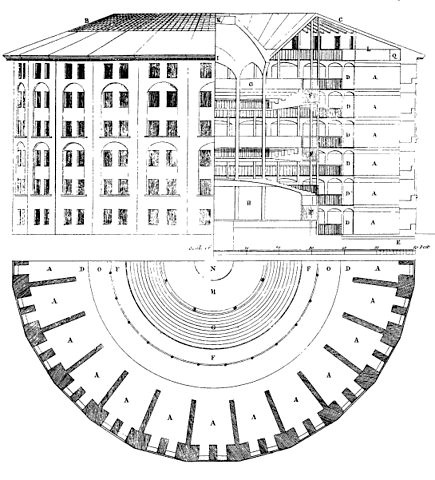
1790 – Prison – Gloucester Penitentiary House established.
1790 – Act – Act enjoining Justices to visit their prisons three times in each quarter.
1793 – Event – Lord George Gordon died in Newgate of Gaol Fever (Typhus).
1793 – Executions – 272 hung in last 7 years in Middlesex.
1794 – Prison – Coldbath Fields Prison built.
1796 – Event – Care for Prisoners of War as taken over from the Sick and Hurt Commission by The Transport Board.
1798 – Police – Thames Marine Police established.
1799 – Aid Society – El Buen Pastor Prisoners’ Aid Society founded in Madrid.
1800 – Act – Death, without benefit of Clergy, for over 160 Offences.
1801 – Prison – 275 Debtors and 375 felons in Newgate Prison.
1802 – Aid Society – Hampshire Discharged Prisoner’s Aid Society (D.P.A.S) founded. The DPAS’ were set-up to provide support for ex-prisoners and their families by providing them with food, shelter, second-hand clothing, work, emotional support and minor medical treatments, such as dentures or spectacles.
1802 – Prison – 720 prisoners in Newgate.
1802 – Act – An Inspector of Hulks appointed.
1803 – Transportation – A Roman Catholic Priest under sentence of transportation, set free at Sydney to act as chaplain for penal colony.
1803 – Prison – Van Dieman’s Land, modern day Tasmania, becomes a Penal Settlement.
1805 – Reformatory – Dalston Refuge founded. This institution was created to care for and instruct unwed mothers in living a better life.
1805 – Executions – 68 persons hanged out of 350 sentenced to death.
1805 – Prison – Building started on Abingdon Prison in Oxfordshire.
1806 – Prison – Eighteen prisons now in London.
1807 – Aid Society – Sheriff’s Fund Society founded. Set up to provide temporary relief for the distressed families of prisoners and to aid discharged prisoners with money, food, clothing and tools.
1809 – Punishment – Last recorded use of the ducking-stool at Leominster, to punish Jenny Pipes for using bad language.
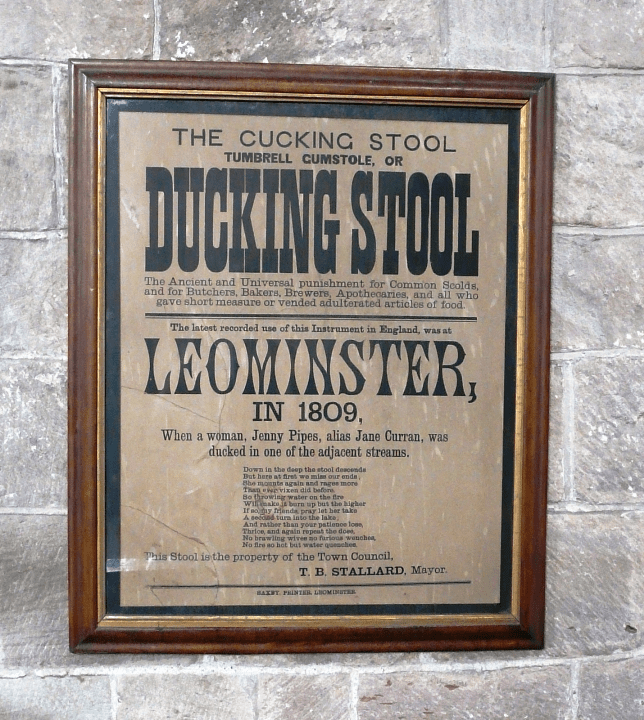
Poster at Leominster church
1810 – Act – Sir Samuel Romilly, social reformer and crusader against capital punishment for lesser crimes, abolished hanging for stealing from a private person (except in cases of shoplifting, on rivers or burglary).
1810 – Prison – Devizes County House of Corrections finished.
1810 – Transportation – To this date, 9,000 convicts had been sent to New South Wales; population in the colony 10,500, of whom 7,000 were convicts.
1811 – Prison – Abingdon Prison receives its first inmates.
1812 – Writing – James Neild, prison reformer, publishes “State of the Prisons” putting pressure on the government for penal reform.
1812 – Act – Sir Samuel Romilly abolished hanging soldiers and sailors found without passes.
1813 – Prison – Building of Millbank Prison begun.
1813 – Prison – 340 debtors in Newgate Prison.
1813 – Event – Mrs Elizabeth Fry first visited Newgate and was appalled by the state of the women and children, some of whom hadn’t even faced a trial. The next day she returned with food and clothing.
1814 – Act – Appointment of chaplains for prisons made compulsory.
1814 – Prison – Jersey Prison erected.
1815 – Act – The pillory abolished except for forgery.
1815 – Act – Inspector of Hulks succeeded by a Superintendent of Hulks.
1815 – Aid Society – Society for the improvement of Prison Discipline founded to ensure the safety of suspected criminals before trial and to ensure that punishment from and beyond trial does not exceed that which is necessary. In addition to promoting ‘industry’ for inmates to keep them moral and occupied.
1816 – Prison – Millbank Prison occupied.
1816 – Event – Mrs Fry began her work at Newgate Prison, starting with a Prison School for the children and a voting system for how the inmates should rule themselves.
1816 – Prison – 3,000 inmates under the age of 20 in London Prisons.
1817 – Aid Society – Association for the Reformation of the Female Prisoners in Newgate, founded to provide training and material for prisoners to learn an occupation and craft.
1816 – Prison – Clerkenwell Prison enlarged and altered.
1817 – Prison – Treadmill set up at Brixton, one of the largest of the 19th century capable of holding up to 24 inmates at any one time.
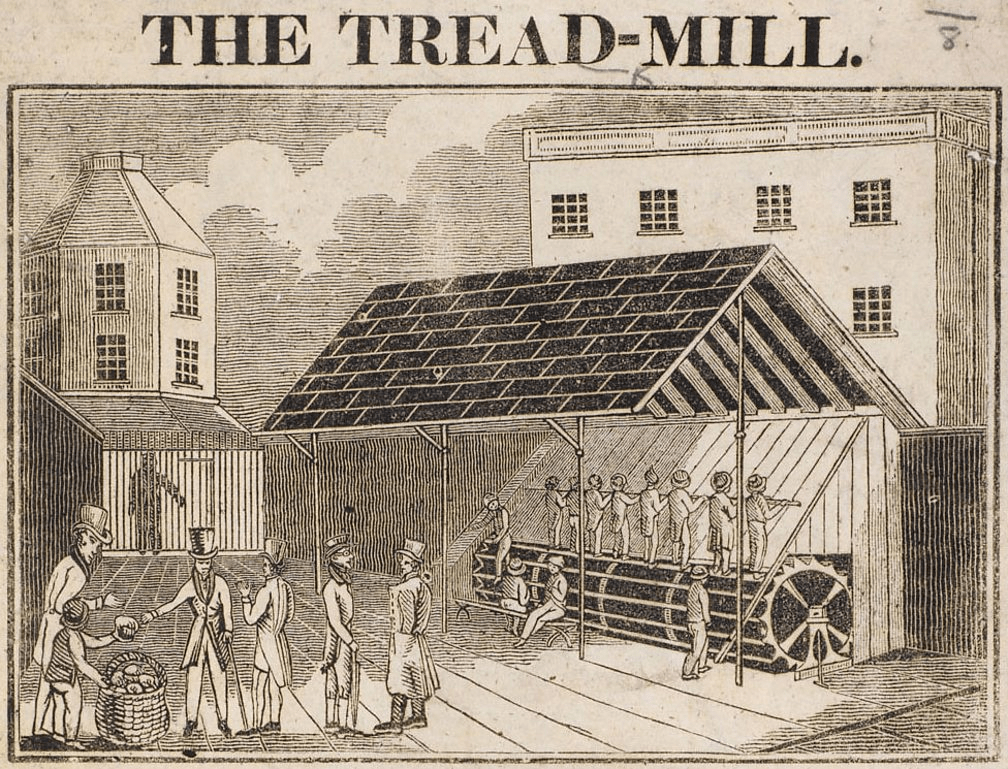
Brixton Treadmill
1817 – Executions – Three men executed at Derby for high treason.
1817 – Event – Care of Prisoners of War taken over by The Victualling Board from The Transport Board.
1818 – Prisons – 518 prisons currently in operation in the United Kingdom, to which over 100,000 prisoners were committed in the year.
1818 – Publication – Mr. Thomas Fowell Buxton’s essay on Prison Discipline, calling for the abolition of capital punishment and condemning the current purpose and operations of prisons.
1818 – Event – Samuel Romilly commits suicide after the death of his wife.
1818 – Event – Sarah Martin begins visiting Tolhouse Gaol in Great Yarmouth, there she reads the bible to inmates, instigates a Sunday School, teaches them how to craft cutlery to sell and how to read and write.
1818 – Event – Last ever ‘trial by battle’ (aka challenging to a duel). Alfred Thornton, accused of murdering a young girl, challenged her brother, the accuser, to a duel; the brother accepted at first and then withdrew.
1819 – Prisons – Russian Imperial Society for guardianship of prisons founded.
1819 – Aid Society – Ladies Prison Association in Liverpool, formed after a visit by Elizabeth Fry.
1819 – Aid Society – Royal Prison Society in France founded.
1820 – Prison – Cato Street Conspirators, those who attempted to murder cabinet ministers in Liverpool, committed to Tower of London: this was the last committal.Conspirators Arthur Thistlewood, Richard Tidd, James Ings, William Davidson and John Brunt were hanged at Newgate Prison on the morning of 1st May 1820.
1820 – Executions – 1,236 sentenced to death in England and Wales, 107 hung, only 10 of whom for murder.
1821 – Prison – Building of Millbank finished.
1821 – Bequest – John Hall leaves £127 for a Christmas Dinner for Northampton Gaol.
1821 – Prisons – 2,854 convicts in six Hulks.
1821 Executions – 7,683 sentenced to death in last seven years in England and Wales – 693 hung, of which 8 boys under 20 were executed at Newgate Prison.
1822 – Aid Society – Royal Female Philanthropic Society founded for the reception of young women convicted and imprisoned for the first time, those discharged from service for dishonesty, but not prosecuted and for those who are ‘ignorant and destitute’.
1823 – Act – Sir Robert Peel’s Gaol Act for Classification of Prisoners.
1823 – Writing – James Mill’s article on Prison Discipline in Encyclopaedia Britannica, condemning labour as punishment but promotes its use in reformation[5].
1823 – Aid Society – Netherland Society for Moral Reformation of Prisoners founded. [MG(C9]
1823 – Prison – Proportion of female prisoners to males, 1 to 10.
1824 – Aid Society – Brighton District Visiting Society set up to encourage wealthy women to visit the homes of the poor to provide help and support.
1824 – Aid Society – Boston (USA) Prison Discipline Society.
1824 – Aid Society – Surrey D.P.A.S founded.
1824 – Act – Vagrancy Act made it illegal to beg for money or sleep rough, solicit for sex or put an obscene image in a public place.
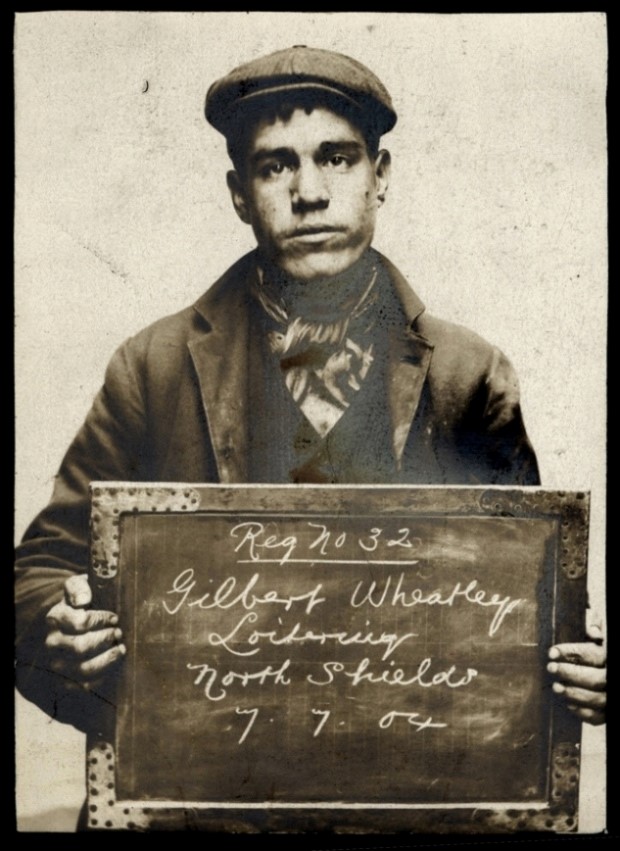
1824 – Prison – Treadmill in Old Gate House Prison, St Albans. Treadmill labour varied from 7,500 feet (Lewes) to 14,200 feet (Boston).
1825 – Reformatory – First American Reformatory opened (Randall’s Island, New York)
1826 – Prison – Norfolk Island, in-between Australia and New Zealand, made a Penal Settlement.
1827 – Prison – Connecticut underground prison abolished after 54 years.
1827 – Act – Prisoners refusing to plead, treated as having pleaded Not Guilty now.
1827 – Act – Benefit of clergy, that is that if you could read from the bible you were exempt from secular punishment, abolished meaning that clergy could now be tried in public rather than ecclesiastical courts.
1827 – Executions – 1,526 sentenced to death, 70 executed.
1828 – Writing – Monsieur Charles Jean Marie Lucas’ “Penitentiary System of Europe and America” published, critiquing capital punishment and giving birth to ‘penitentiary science’ i.e. the study of prisons.
1829 – Executions – Last execution for forgery.
1829 – Police – Metropolitan Police established.
1829 – Prison – Beaumaris Gaol opened in Angelsey.
1830 – Executions – Last execution for Piracy on the Thames.
1830 – Prison – Debtors in prison on Jan 1st, King’s Bench 671, Fleet 242, Whitecross Street 457, Marshalsea 113, Horsemonger Lane 64.
1831 – Executions – Last execution in Newgate for Sheep-stealing.
1831 – Event – Preston Prison attacked by 2,000 rioters.
1831 – Executions – 52 persons hanged out of 1,601 sentenced to death.
1831 – Prison – Criminals to population; Ireland 1 in 490, England 1 in 740, Scotland 1 in 1,130 and Wales 1 in 2,320
1832 – Executions – Last execution in Newgate for stealing letters.
1831 – Act – Capital Punishment abolished for cattle-stealing and larceny from dwelling-houses (burglary).
1831 – Act – The bodies of persons executed to be buried within precincts of the prison in which they were executed.
1833 – Act – Capital Punishment for housebreaking abolished.
1833 – Executions – A child nine years old sentenced to be hanged for poking a stick through a window and stealing paint, value 2 1/2 pence; reprieved.
1834 – Act – Capital Punishment for returning from transportation abolished.
1834 – Prison – Home Office criminal returns begin.
1834 – Prison – Silent System introduced to Coldbath Fields Prison.
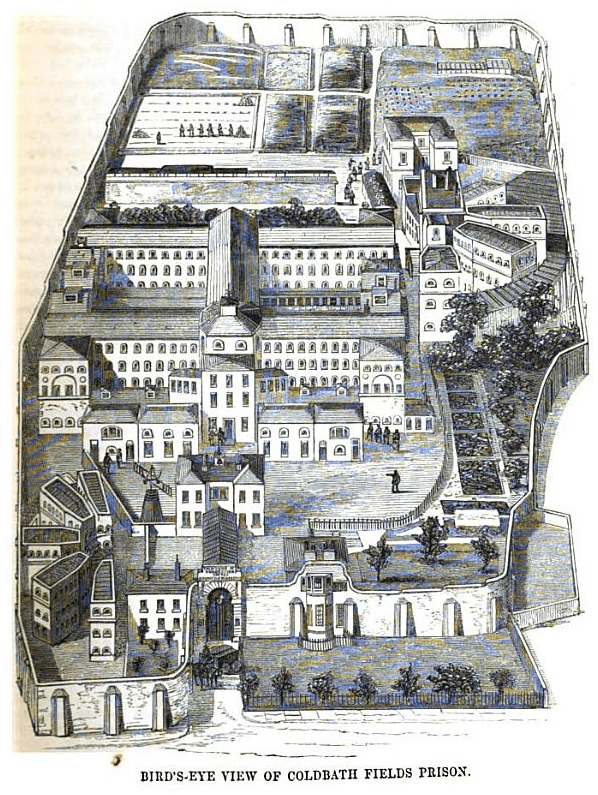
1834 – Prison – Chaplain first appointed at St Albans Gaol.
1834 – Aid Society – The Devon and Cornwall Female Orphan Asylum was established for the maintenance and education of orphan girls. The first five girls were admitted to the Asylum in Octagon Street on May 14th that same year[6].
1834 – Transportation – 4,900 prisoners transported this year. Number of convicts in Van Dieman’s Land was about 15,000.
1835 – Aid Society – Warwickshire D.P.A.S founded.
1835 – Act – Capital Punishment abolished for sacrilege.
1835 – Police – Borough Police established.
1835 – Prison – Cellular System tried in Ghent Prison, Belgium.
1835 – Prison – Count Charles Ferdinand Montesino de Lancastro introduces system of teaching prisoners a trade at Valencia.
1835 – Act – Act passed for Reform in Prisons.
1836 – Prison – Tothill Fields New Prison building founded.
1836 – Transportation – 4,723 transported to Australia.
1836 – Publication – Monsieur Lucas’ “Theory of Imprisonment” published. In it he explores how a sentence of 10 years is 5/7ths of a death sentence, owing to the impaired health and mortality of inmates in such conditions.
1837 – Aid Society – Southampton Ladies’ Prison Visiting Association founded, based on principles of Elizabeth Fry’s first association.
1837 – Prison – Rev. D. Nihill appointed Governor-Chaplain of Millbank.
1837 – Punishment – The pillory, a wooden or metal framework to secure prisoners in public, altogether abolished.
1837 –Reformatory – Parkhurst opened as Reformatory for boys.
1837 – Prison – 256 prisons in England and Wales. 4,068 transported to Australia.
1837 – Prison – Chaplain appointed to Norfolk Island Convicts after ten years of its establishment.
1838 – Transportation – Committee of House of Commons report against transportation system.
1838 – Prison – Roman Catholic chaplain appointed to Norfolk Island.
1838 – Act – Assignment system abolished in Australia.
1838 – Transportation – Total number of convicts sent to Australia during the continuance of the System, 134,308.
1838 – Punishment – 158,000 lashes inflicted in once year in New South Wales and Van Dieman Land.
1839 – Police – County Police established.
1839 – Act – Act passed giving the Secretary of State power over the designs of new prisons or the alterations of old ones.
1840 – Prison – Pentonville Model Prison begun to contain 520 cells at cost of £90,000.
1840 – Prison – Prince Oscar’s (of Sweden) Punishments and Penitentiary Establishments.
1840 – Prison – Up to this date no diet but bread and water in St Albans Gaol.
1840 – Prison – Last occasion (François Benjamin Courvoisier) on which the public were admitted to the chapel at Newgate to hear “the condemned sermon”.
1841 – Industrial School – First Industrial School opened, ‘Schools of Industry for Boys and Girls’ in Aberdeen. It was set-up to teach vagrant and poor children useful skills and to provide bed and board.
1842 – Aid Society – Bath Discharged Prisoners’ Aid Society founded.
1842 – Prison – Pentonville Prison occupied.
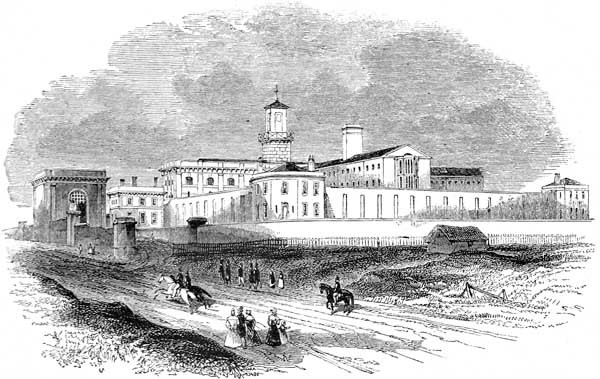
1842 – Act – Separate System introduced and Separate Stall system in Chapel.
1842 – Prison – Probation System introduced in Australia.
1842 – Prison – 124,822 prisoners in English and Welsh prisons in this year.
1843 – Event – Sarah Martin, the famous prison visitor, died.
1844 – Prison – Reading Gaol opened.
1845 – Prison – Horsham Prison closed.
1845 – Act – Act passed creating the role of Surveyor-General to prisons.
1845 – Event – First International Prison Reform Congress held at Frankfurt-on-Main.
1846 – Prison – First foundation stone laid for Clerkenwell House of Detention.
1846 – Prison – Preston prison is the first ever local prison to adopt the separate system.
1846 – Event – Second International Prison Reform Congress Brussels.
1847 – Industrial School – West Riding Industrial Home for destitute female prisoners.
1847 – Act – Committee of Parliament on Prisons and Punishments.
1847 – Act – Juvenile Offenders’ Acts.
1847 – Act – Office abolished of Superintendent of the Hulks.
1848 – Reformatory – Durham Refuge for Discharged Prisoners founded. The refuge provided schooling, small loans and limited accommodation but within 4 years, 499 out of 537 prisoners who went there have resumed a ‘normal’ life.
1848 – Prison – Baden Cellular Prison built.
1848 – Transportation – 296 transported to Bermuda.
1849 – Prison – Birmingham and Winchester prisons opened.
1849 – Elizabeth Fry Refuge founded, a place where young women discharged from prisons and police stations could find temporary accommodation.
1849 – Prison – First stone of Holloway Prison laid.
1849 – Prison – 7,000 young convicts at Parkhurst.
1850 – Aid Society – Worcestershire D.P.A.S founded.
1850 – Prison – Cellular Prison erected at Amsterdam.
1850 – Prison – Dartmoor Convict Prison opened.
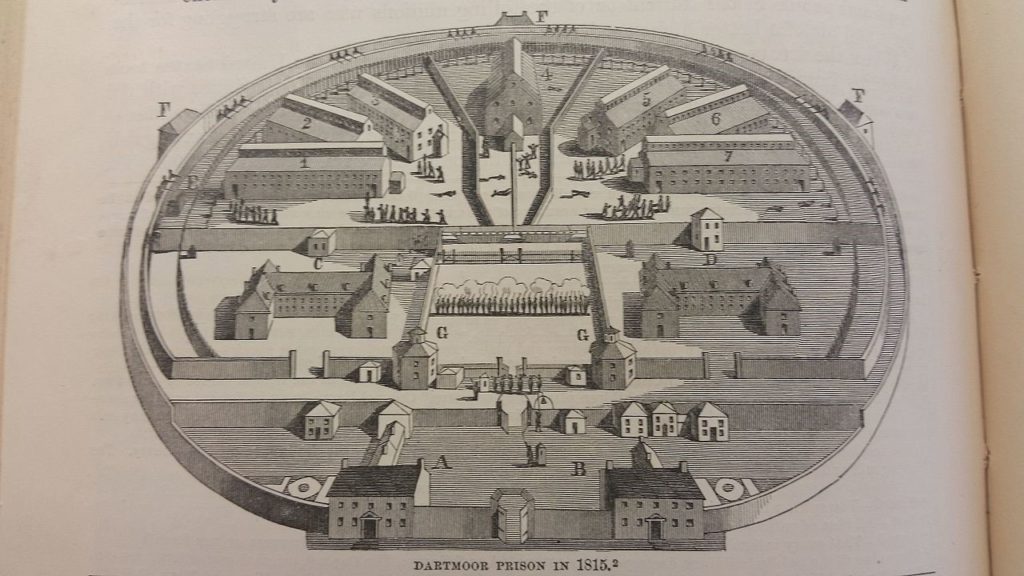
1850 – Prison – Investigation into the state Birmingham Borough Jail.
1850 – Act – Board of Directors of Convict Prisons created.
1851 – Prison – Mark system first introduced into Birmingham Prison by Captain Maconochie.
1851 – Prison – Wandsworth Prison opened.
1851 – Reformatory – Reformatory Conference in Birmingham.
1852 – Prison – Portsmouth Convict Prison first opened.
1852 – Prison – Holloway Prison Opened.
1852 – Transportation – 2,541 transported to Australia.
1853 – Event – Prison Congress in Paris.
1853 – Transportation – 600 transported to Australia.
1853 – Act – Penal Service Act 1, establishing ticket-of-leave system.
1853 – Prison – New Lewes Prison opened.
1853 – Prison – 14,507 juveniles under 17 imprisoned.
1854 – Act – First Reformatory Act. First Industrial Schools Act for Scotland.
1855 – Act – Criminal Justice Act.
1856 – Aid Society – Birmingham Discharged Prisoners’ Aid Society founded.
1856 – Aid Society – Gloucester Prisoners’ Charity Fund founded.
1856 – Transportation – Committee of House of Commons reports in favour of transportation.
1856 – Reformatory – Fulham Refuge opened for the reception of convicts.
1857 – Aid Society – Hull and Royal D.P.A.S. founded.
1857 – Event – Judicial Statistics first published.
1857 – Act – Penal Servitude Act 2.
1857 – Act – Industrial School Acts for England.
1857 – Prison – Convict Hulk Defence, holding the invalid inmates, destroyed by fire at Woolwich. No deaths or escapes. Inmates transferred to Milbank then temporary barracks at Lewes prison.
1857 – Reformatory – Reverend Sidney Turner appointed Inspector of Reformatories.
1857 – Event – Third International Prison Reform Congress in Frankfurt.
1858 – Event – Reverend John Clay, chaplain of Preston Gaol, died.
1859 – Transportation – Transportation to Bermuda ceased.
1858 – Prison – Building started on Woking Invalid Convict Prison.
1860 – Aid Society – East Glamorganshire D.P.A.S founded.
1859– Prison – Woking open as Invalid Convict Prison.
1862 – Aid Society – Kent D.P.A.S founded.
1862 – Act – Discharged Prisoner’s Aid Society Act.
1862 – Prison – 193 prisons in England and Wales.
1862 – Act – Coroner’s inquest to be held on every prisoner who died in prison.
1863 – Aid Society – Essex Discharged Female Prisoner’s Aid Society founded.
1863 – Prison – Parkhurst made Female Convict Prison.
1863 – Event – Prison Congress, Brussels.
1863 – Act – Royal Commission on working Penal Servitude Acts. Act passed permitting flogging for robbery with violence.
1864 – Reformatory – Carlisle Memorial Refuge at Winchester founded.
1864 – Aid Society – Mrs. Mary Ellen Peacock Meredith’s Discharged Female D.P.A.S (also known as The Mission) founded. Used by female prisoners on completion of sentence, as a safe house and temporary accommodation.
1864 – Reformatory – West Riding Industrial Home for Discharged Male Prisoners.
1864 – Act – Penal Servitude Act 3.
1864 – Prison – Mark System introduced into convict prisons.
1864 – Prison – 146 prisons in England and Wales.
1864 – Prison – Parkhurst closed for juvenile prisoners.
1865 – Aid Society – North Staffordshire, Usk and South Staffordshire D.P.A.S founded.
1865 – Act – Capital Punishment Commission.
1865 – Act – Prisons Act.
1866 – Aid Society – Glasgow and Manchester D.P.A.S founded.
1866 – Aid Society – Howard Association instituted[7].
1866 – Executions – Last public execution at Lewes.
1866 – Act – Industrial Schools Acts of 1855-6 repealed and new Act passed.
1867 – Transportation – Transportation to Australia ceased after 451 sent this year.
1867 – Event – Fenian destruction of wall of House of Detention.
1867 – Prison – 130 Prisons in England and Wales.
1867 – Prison – St Albans Prison opened in place of Old Gaol.
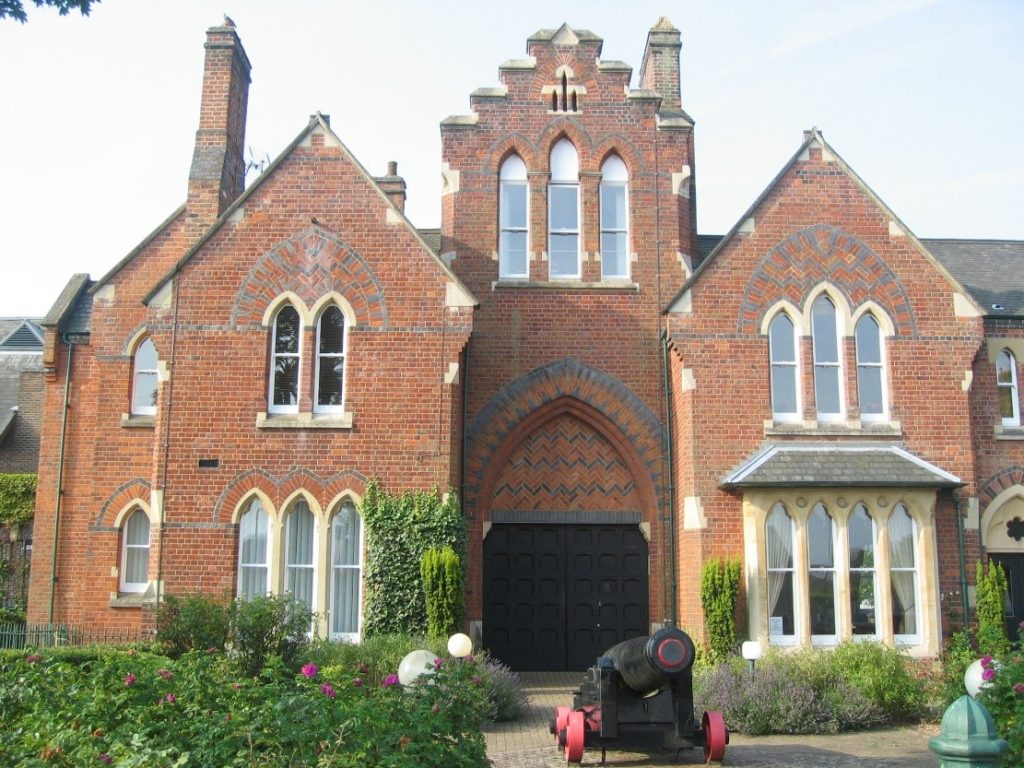
1868 – Executions – Last public Execution, May 26th. First Private Execution in Newgate, September 16th.
1868 – Prison – Abingdon Prison closes.
1869 – Aid Society – East Sussex D.P.A.S founded.
1869 – Prison – Salisbury Prison closed.
1869 – Act – Habitual Criminals Act.
1869 – Prison – Parkhurst made Male Convict Prison.
1869 – Prison – Woking Female Convict Prison opened.
1869 – Aid Society – Maryland Prison Aid Association.
1869 – Prison – Several military prisons closed.
1870 – Aid Society – Liverpool, Wiltershire and East Sussex D.P.A.S founded.
1870 – Act – Habitual Criminals Act 2.
1870 – Event – Cincinnati Prison Congress.
1870 – Event – National Prison Association of New York.
1871 – Aid Society – Essex Male D.P.A.S founded.
1871 – Act – Prevention of Crimes Act.
1871 – Event – Archbishop Darboy shot in La Grand Roquette.
1871 – Prison – Fulham Refuge abolished and Female Convict Prison opened.
1872 – Aid Society – Bristol, Cornwall and Dundee D.P.A.S founded.
1872 – Reformatory – Westminster Memorial Refuge (Streatham) founded.
1874 – Aid Society – Bath, Portsmouth and Dundee D.P.A.S founded.
1874 – Prison – Borstal Convict Prison opened.
1874 – Act – Prison authorities empowered to borrow money to meet capital expenditure.
1875 – Aid Society – Devon and Suffolk D.P.A.S founded.
1875 – Aid Society – Dublin Prison Mission founded.
1875 – Transportation – Transportation to Gibraltar ceased.
1876 – Aid Society – Belfast Prison Gate Mission founded.
1876 – Aid Society – Cheshire and Edinburgh D.P.A.S founded.
1877 – Aid Society – Nottingham D.P.A.S founded.
1877 – Act – Prisons Act, now all local prisons under Government. 113 Prisons in England and Wales.
1878 – Prison – Horsemonger Lane Gaol closed along with 36 other prisons, leaving only 69 left.
1878 – Punishment – Separate Stalls in Chapel and use of masks abolished.
1878 – Punishment – Treadwheel used in 32 Prisons.
1878 – Prison – Officers libraries established.
1878 – Prison – St Albans Prison made a county prison.
1878 – Event – Stockholm International Prison Congress.
1878 – Event – Prisons transferred to Government, April 2nd.
1878 – Prison – Beaumaris Gaol closes.
1878 – Prison – Petworth Prison closed.
1879 – Prison – Payment to Roman Catholic Prison Ministers authorized.
1880 – Prison – Treadmill introduced to Birmingham Prison.
1880 – Prison – 67 prisons in England and Wales (only 8 now described as old and bad).
1880 – Prison – Roman Catholic Ministers in 38 prisons.
1880 – Priosn – New Roman Catholic chapels in Maidstone and Hull prisons.
1880 – Prison – Re-establishment of Military Prisons.
1881 – Aid Society – Guild of SS. Paul and Silas founded.
1881 – Aid Society – Hertfordshire D.P.A.S founded.
1881 – Prison – Northampton and Southwell Prisons closed.
1882 – Act – Prison Charities Act.
1882 – Prison – Newgate closed as an ordinary prison.
1883 – Prison – Tothill Fields Prison (Westminster) closed.
1883 – Prison – New prison chapels at Hereford, Derby and Strangeways.
1883 – Prison – Four pentagons of Millbank used for female convicted prisoners in lieu of Tothill Fields.
1884 – Prison – 430 prisoners killed in quelling riot in Mandalay Prison.
1884 – Prison – Spalding, Chester and Taunton prisons closed.
1885 – Executions – First execution in Birmingham Prison.
1885 – Prison – 62 prisons in England and Wales. Population of Prisons, 15,484, lowest figure known.
1885 – Prison – Coldhill Fields and Huntington Prison closed.
1886 – Prison – Clerkenwell Prison closed.
1887 – Writing – Rev. John William Horsley publishes ‘Jottings from Jail’ a book chastising the treatment of alcoholics in prison, lambasting young marriages and presents an accurate picture of prison conditions.
1889 – Prison – Woking Prison Male departments
closed. Female department still in use.
[1] ‘History – 1772′ (1772charity.org, 2020) <http://1772charity.org/history/> accessed 28 February 2020.
[2] http://media.wix.com/ugd//4c2da0_41bed342ea390827839e1ffa4b3dca97.pdf
[3] https://philadelphiaencyclopedia.org/archive/pennsylvania-prison-society/
[4] https://www.surreycc.gov.uk/culture-and-leisure/history-centre/marvels/royal-philanthropic-school-at-redhill
[5] https://oll.libertyfund.org/titles/mill-prisons-and-prison-discipline
[6] http://www.oldplymouth.uk/Devon%20and%20Cornwall%20Female%20Orphan%20Asylum.htm
[7] https://howardleague.org/about-us/
Important Laws and Acts which affected institutions of the Victorian Period
1823 – Act – Judgement of Death Act – This abolished the mandatory death penalty, by giving judges the option to reduce the mandatory death sentences for crimes (other than treason and murder) to punishments of imprisonment or transportation. The sentence of death was still recorded but not carried out.
1834 – Act – Poor Law Amendment Act – The act prevented poor relief abuse (common in the southern counties) by ensuring that poor relief would ONLY be provided within Workhouses – whilst keeping them in such a bad condition, that only the truly destitute would apply. The Poor Law Amendment Act was only repealed in 1948! [1]
20th June 1837 – Alexandrina Victoria became Queen Victoria the first of the United Kingdom of Britain and Ireland.
1839 – Act – County Police Act – The act allowed Justices of the peace to establish police forces in their counties. This was not mandatory but was enacted in 25 out of the 55 counties.
10th February 1840 – Queen Victoria married Prince Albert of Saxe-Coburg and Gothe.
10th June 1840 – Edward Oxford attempted to assassinate Queen Victoria. Edward was later acquitted and found “Not guilty by reason of insanity”.
1840 – Act – Chimney Sweepers and Chimneys Regulation Act – This prohibited any person under the age of 21 being compelled or knowingly allowed to ascend or descend a chimney for flue sweeping, cleaning or coring.
1840 – Act – Evidence (Scotland) Act – This meant that no person could refuse to testify based on relationship to the defendant.
1840 – Act – Infant Felons Act – Gave the court of Chancery the right to transfer the care of the child away from any convicted felon.
1840 – Act – Vaccination Act – The act outlawed Variolation (Variolation involved cutting open the flesh and inserting live toxins into the system in the hopes that a mild strain would affect the individual) and offered free smallpox vaccination for the poor.
1841 – Act – Abolition of Slavery Act – This act ended the “Apprenticeships” of former slaves. Slavery was illegal across the empire (excluding India) from this date. Complete emancipation was enforced in India and all other crown ruled countries by 1843.
1842 – Act – Income Tax Act – This act introduced a tax of 7 pence per pound on incomes above £150 per annum.
1842 – Act – Mines and Collieries Act – This act prohibited women and boys under 10 years of age from working in mines.
1842 – Pentonville Prison Built
1844 – Act – Railway Regulation Act – This act mandated “parliamentary” trains, which were trains with 3rd class provisions at reasonable prices. The act demanded that third class carriages were covered and had seats, so that poor people could travel and find work.
1845 – Act – The Gaming Act – This act stated that a wager was no longer enforceable as a contract, meaning gambling debts had less impact and a man could not be imprisoned for failing to pay.
1845 – Act – Lunacy Act – This act changed the status of mentally ill people to patients and thus requiring care, it also (in conjunction with the County Lunacy Act) made provisions for inspections of asylums, and for all asylums to have medical personnel and a set of written regulations. This act had no age limit and resulted in the admittance of many children.
1846 – Act – Fatal Accidents Act – For the first time ever, relatives of a deceased person could claim compensation if there was any wrongdoing.
1847 – Act – 10 Hours Act – This Act restricted the hours women and young people (aged 13 -18) could work: up to 10 hours per day with a maximum of 63 hours per week.
1848 – Act – Public Health Act – Established a Central Board of Health and ensured any location with a death rate of above 23 in 1000, was required to set up a local health board.
1849 – Act – Cruelty to Animals Act – The act carried the previous fines for overbeating animals and included a possible prison sentence for unlawful killing of animals.
1851 – Act – Arsenic Act – This act required sellers of arsenic to keep a written record of purchasers. In effect, it became a controlled substance.
1851 – Act – Labouring Classes Lodging Act – One of the first forms of social housing, this allowed councils to use public money to build lodgings for unmarried working people.
1853 – Act – Vaccination Act – The act made smallpox vaccination mandatory in all infants during the first 3 months of their lives.
1856 – Act – County and Borough Police Act – Made the provision of local police forces mandatory in all counties.
1861 – Act – Punishment of Death Act – Attempted murder no longer carried a mandatory death sentence.
1861 – Act – Offences Against the Person Act – This was a consolidation of the below acts into a single acts with some amendments.
- Disposal of bodies – Any person executed for murder was to be buried within the walls of the prison as opposed to being hung in chains, which was the previous expectation.
- Soliciting to Murder – This crime was formally recognised and given a mandatory sentence “[of] not more than Ten and not less than Three Years,—or to be imprisoned for any Term not exceeding Two Years, with or without Hard Labour”[2].
- Manslaughter – This sentence was adjusted “Whosoever shall be convicted of manslaughter shall be liable, at the discretion of the court, to be kept in penal servitude for life.”
- Murder Overseas – This amendment gave British courts the right and responsibility to convict and punish any subject found guilty of murder, even if that murder was committed outside of the Queen’s Dominion.
- Threats to Kill – A person who, without lawful excuse, makes to another a threat; intending that that other would fear it would be carried out, to kill that other or a third person shall be guilty of an offence and liable on conviction on indictment to imprisonment for a term not exceeding ten years[3].
- Grievous Bodily Harm – “Whosoever shall unlawfully and maliciously by any means whatsoever wound or cause any grievous bodily harm to any person … with intent … to do some … grievous bodily harm to any person, or with intent to resist or prevent the lawful apprehension or detainer of any person, shall be guilty of felony, and being convicted thereof shall be liable … to be kept in penal servitude for life”.
- Neglect or Bodily Harm to Servants – This was now punishable by up to 5 years imprisonment.
- Assaulting or Obstructing a Clergyman in the Execution of His Duties – This misdemeanour now carried a sentence of up to 2 years.
- Rape – This section provided that a person guilty of rape was liable to be kept in penal servitude for life or for any term not less than three years or to be imprisoned (with or without hard labour) for any term not exceeding two years.
- Abortion –
- Using any Implement or Substance to Encourage Abortion – This carried a life sentence and was considered a felony.
- Supplying or Procuring Poison or Implements for the Purpose of Abortion – This carried a life sentence and was considered a felony.
- Concealing a Birth – This allowed for the imprisonment of up to 2 years for any person found guilty of (or guilty of colluding in) the concealment of a birth. Whether the child died before, after, or during the birth.
- Buggery – This ammendment removed the death penalty for buggery and allowed for a penal sentence of at least 10 years up to life imprisonment.
1867 – LAW – Second Reform Act – Enfranchising ALL male householders (or tenants) who paid £10 or more in rent per annum.
1867 – Act – Vaccination Act – The compulsory vaccination program was extended to 14 year olds also with penalties for non-compliance.
26th May 1868 – The last public hanging took place, ending the life of one Michael Barrett for his part in the Clerkenwell Bombing.
1868 – Act – Capital Punishment Amendment Act – Any sentence of death was to be carried out within the walls of the prison in which the convict was incarcerated, and not in public.
1908 – Act – The
Children Act – No child under 16 could be executed for any crime. (In 1933,
this was extended to 18 years of age).
[1] https://oll.libertyfund.org/simple.php?id=1461
[2] http://www.legislation.gov.uk/ukpga/Vict/24-25/100/crossheading/homicide-conspiring-or-soliciting-to-commit-murder/enacted
[3] http://www.legislation.gov.uk/ukpga/Vict/24-25/100/section/16
Medicine, Health & Healing a Timeline of 19th Century England
1799 – Discovery – Sir Humphrey Davy coined the term ‘Laughing Gas’ for Nitrous Oxide after he had tested it on himself and found it to desensitise pain[2].
1800 – Act – Criminal Lunatics Act – Any person charged with treason, murder or a felony and was deemed to be insane at the time of the offence could be held indefinitely at a place of the Court’s choosing[3].
1804 – Discovery – Friedrich Sertürner isolated morphine from opium. His discovery was announced in Trommsdorffs ‘Journal der Pharmacie’ in 1805[4].
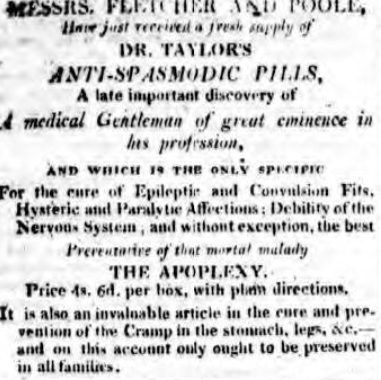
1808 – Act – County Asylums Act – This act encouraged Justices of the Peace to provide asylums for mentally ill paupers and allowed counties to ‘levy a rate’ to pay for this[5].
1816 – Invention – The Stethoscope was invented by René Laennec in Paris[6].
1825 – Event – James Blundell, an obstetrician, gave the first recorded successful blood transfusion to a woman sufferng from post-partum haemorrhage[7].
1832 – Act – Anatomy Act – Dissection on ‘unclaimed bodies’ (bodies from prisons, workhouses and asylums) and bodies donated by next of kin, allowed for physicians, surgeons and students[8].
1833 – Event – Johannes Müller publishes his ‘manual of human physiology’ and codifies for the first time, physiology as a distinct science[9].
1840 – Act – Vaccination Act – Variolation, a form of early vaccination, made legal and offered free of charge[10].
1841 – Invention – The Cheltenham Chronicle reported the invention of a “Sphymometer” which allowed for the visualisation of the heartbeat. This is the forerunner to the blood pressure monitor (sphygmomanometer) of the modern era[11].
1845 – Discovery – Leukaemia first described as a blood disorder by John Hughes Bennett[12].
1846 – Event – Robert Liston conducted the first surgery in Europe using ether as anaesthesia[13].
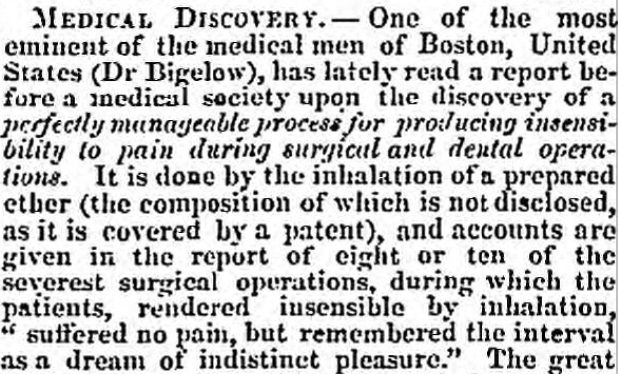
1845 – Act – Lunacy Act – This act changed the status of mentally ill people to patients, it also (in conjunction with the County Lunacy Act) made provisions for inspections of asylums, and for all asylums to have medical personnel and a set of written regulations. This act had no age limit and resulted in the admittance of many children[14].
1846 – Trivia – Cartwright, a doctor, advises the use of yeast as a treatment for “putrid fever” if given in doses of two large spoons every two hours[15].
1847 – Discovery – Ignaz Semmelweis discovered that women treated by the midwives died of Puerperal Fever far less than those treated by doctors. He reasoned that handwashing in chloride of lime was the cause which was used by the midwives before attending a birth [16].
1848 – Trivia – Buchan’s ‘Domestic Medicine’ listed ‘night air’, anger and wet feet as causes of disease[17].
1849 – Event – Elizabeth Blackwell became the first woman to gain a medical degree in the USA[18].
Figure 1Diagram of cholera deaths in England during 1849. Copyright Wellcome Library, London. Creative Commons Attribution 4.0 International
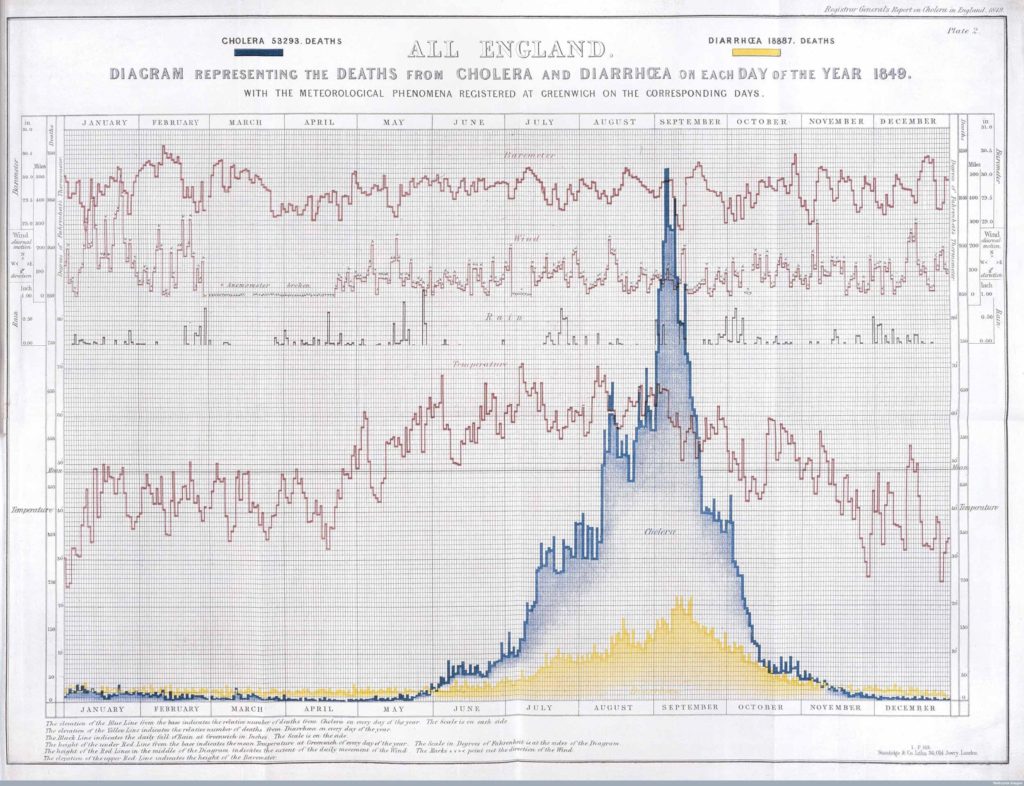
1853 – Act – Vaccination Act – The act made smallpox vaccination mandatory in all infants during the first 3 months of their lives[19].
1854 –Discovery – Jon Snow proved that a cholera outbreak stemmed from a specific pump in London.
1856 – Event – Establishment of the British Medical Association.
1856 – Event – Establishment of the General Medical Council.
1857 – Discovery – Louis Pasteur proves germs cause disease[20].
1860 – Trivia – Florence Nightingale wrote to Edwin Chadwick recommending the “Water Cure” as part of a treatment for consumption (TB)[21]. Charles Dickens also wrote about this common practice in his 1856 ‘Volume of Household Words’[22].
1861 – Act – Offences Against the Person Act
– This was a consolidation of various acts with some amendments.
- Disposal of bodies – Any person executed for murder was to be buried within the walls of the prison as opposed to being hung in chains, which was the previous expectation.
- Abortion –
- Using any Implement or Substance to Encourage Abortion – This carried a life sentence and was considered a felony.
- Supplying or Procuring Poison or Implements for the Purpose of Abortion – This carried a life sentence and was considered a felony.
- Concealing a Birth – This allowed for the imprisonment of up to 2 years for any person found guilty of (or guilty of colluding in) the concealment of a birth. Whether the child died before, after, or during the birth.
1867 – Event – Joseph Lister published a paper, Antiseptic Principle of the Practice of Surgery, which documented his use of Carbolic Acid to avoid infection in post-operative patients[23].
1867 – Act – Vaccination Act – Update of previous acts; financial incentive for vaccinators, convictions and fines for parents who did not vaccinate[24].
1871 – Act – Vaccination Act – Appointment of Vaccination Officer who could request family members in court who fail to vaccinate[25].
1873 – Act – Vaccination Act – Vaccination compulsory for all[26].
1875 – Act – Public Health Act – Local authorities now had powers to better regulate housing, water supplies and streets to combat unsanitary conditions[27].
1879 – Trivia – A false cure for malaria without the use of medicine was announced[28].
1879 – Discovery – First vaccine created for chicken cholera by Louis Pasteur.
1881 – Discovery – First vaccine created for anthrax by Louis Pasteur.
1882 – Discovery – First vaccine created for rabies by Louis Pasteur.
1883 – Act – Trial of Lunacy Act – Jury could now return a verdict in a trial that the defendant was ‘Guilty but insane’ as a response to Queen Victoria, the target of a number of assaults by the insane, asking for it to be changed from ‘Not Guilty’[29].
1886 – Act – Idiots Act – First distinction between ‘Idiots’, ‘Lunatics’ and ‘Imbeciles’ and made it easier to commit them to ‘educational institutions’.
1886 – Act – Lunacy (Vacating of Seats) – Any MP found to be of ‘unsound mind’ could be removed from their seat[30].
1887 – Discovery – First contact lenses developed.
1890 – Event – Robert Koch announced he had discovered a means of curing tuberculosis[31].
1890 – Event – Bee stings are reported as a cure for rheumatism.
1890 – Act – Lunacy Act – Local authorities now obliged to provide for the mentally ill and introduction of increased controls for certification[32].
1890 – Discovery – Antitoxins discovered by Emil von Behring who uses them to develop tetanus and diphtheria vaccines.
1891 – Event – DoctorJ. Hardwick claimed to have found a cure for both Lupus and cancer[33] but, unfortunately, it was later proved to be false.
1898
– Act – Vaccination Act – Conscientious objectors to vaccination could
obtain certificates of exemption from doctors but this had to be achieved by
the child was 4 months old.
[1] https://www.who.int/csr/disease/smallpox/vaccines/en/
[2] https://publicdomainreview.org/collections/the-nitrous-oxide-experiments-of-humphry-davy/
[3] https://www.jstor.org/stable/3053574?seq=1#page_scan_tab_contents
[4] https://www.ncbi.nlm.nih.gov/pmc/articles/PMC5125194/
[5] https://www.countyasylums.co.uk/history/
[6] http://broughttolife.sciencemuseum.org.uk/broughttolife/techniques/stethoscope
[7] https://www.resuscitationjournal.com/article/S0300-9572(02)00013-8/pdf
[8] https://www.nationalarchives.gov.uk/education/resources/body-snatchers/source-four-the-anatomy-act-1832/
[9] https://biography.yourdictionary.com/johannes-peter-muller
[10] https://www.ncbi.nlm.nih.gov/pmc/articles/PMC1123944/
[11] https://www.britishnewspaperarchive.co.uk/viewer/bl/0000311/18410916/016/0004
[12] https://jamanetwork.com/journals/jama/fullarticle/345533
[13] https://www.thelancet.com/journals/lancet/article/PIIS0140-6736(17)32362-0/fulltext
[14] https://www.britannica.com/topic/Lunacy-Act-of-1845
[15] https://www.britishnewspaperarchive.co.uk/viewer/bl/0000053/18460719/011/0003
[16] https://books.google.co.uk/books?id=hnezngRghTgC&printsec=frontcover&dq=Etiology,+Concept+and+Prophylaxis+of+Childbed+Fever&redir_esc=y#v=onepage&q&f=false
[17] http://www.vam.ac.uk/content/articles/h/health-and-medicine-in-the-19th-century/
[18] https://cfmedicine.nlm.nih.gov/physicians/biography_35.html
[19] https://www.ncbi.nlm.nih.gov/pmc/articles/PMC1123944/
[20] https://www.sciencehistory.org/historical-profile/louis-pasteur
[21] https://www.bl.uk/collection-items/letter-from-florence-nightingale-describing-the-benefits-of-clean-air?shelfitemviewer=1&fromother=1&imgSelectedId={1C3A9BB1-535D-4E69-9FCB-28B822D88E83}#
[22] https://archive.org/details/householdwords14dick/page/n5?q=”Water+Cure”
[23] https://sourcebooks.fordham.edu/mod/1867lister.asp
[24] https://www.ncbi.nlm.nih.gov/pmc/articles/PMC1123944/
[25] https://www.le.ac.uk/lahs/downloads/1967-68/1967-68%20(43)%2035-44%20Ross.pdf
[26] https://www.lincstothepast.com/Download/1360
[27] https://navigator.health.org.uk/content/public-health-act-1875
[28] https://www.britishnewspaperarchive.co.uk/viewer/bl/0000081/18791020/035/0008
[29] http://www.legislation.gov.uk/ukpga/Vict/46-47/38/section/2
[30] https://hansard.parliament.uk/commons/1916-08-16/debates/336b45c6-98a3-4611-8486-c3014ace3916/Lunacy(VacatingOfSeats)Act1886
[31] https://www.britishnewspaperarchive.co.uk/viewer/bl/0000902/18900912/013/0002
[32] https://www.ncbi.nlm.nih.gov/pmc/articles/PMC5426304/
[33] https://www.britishnewspaperarchive.co.uk/viewer/bl/0000919/18910618/087/0007